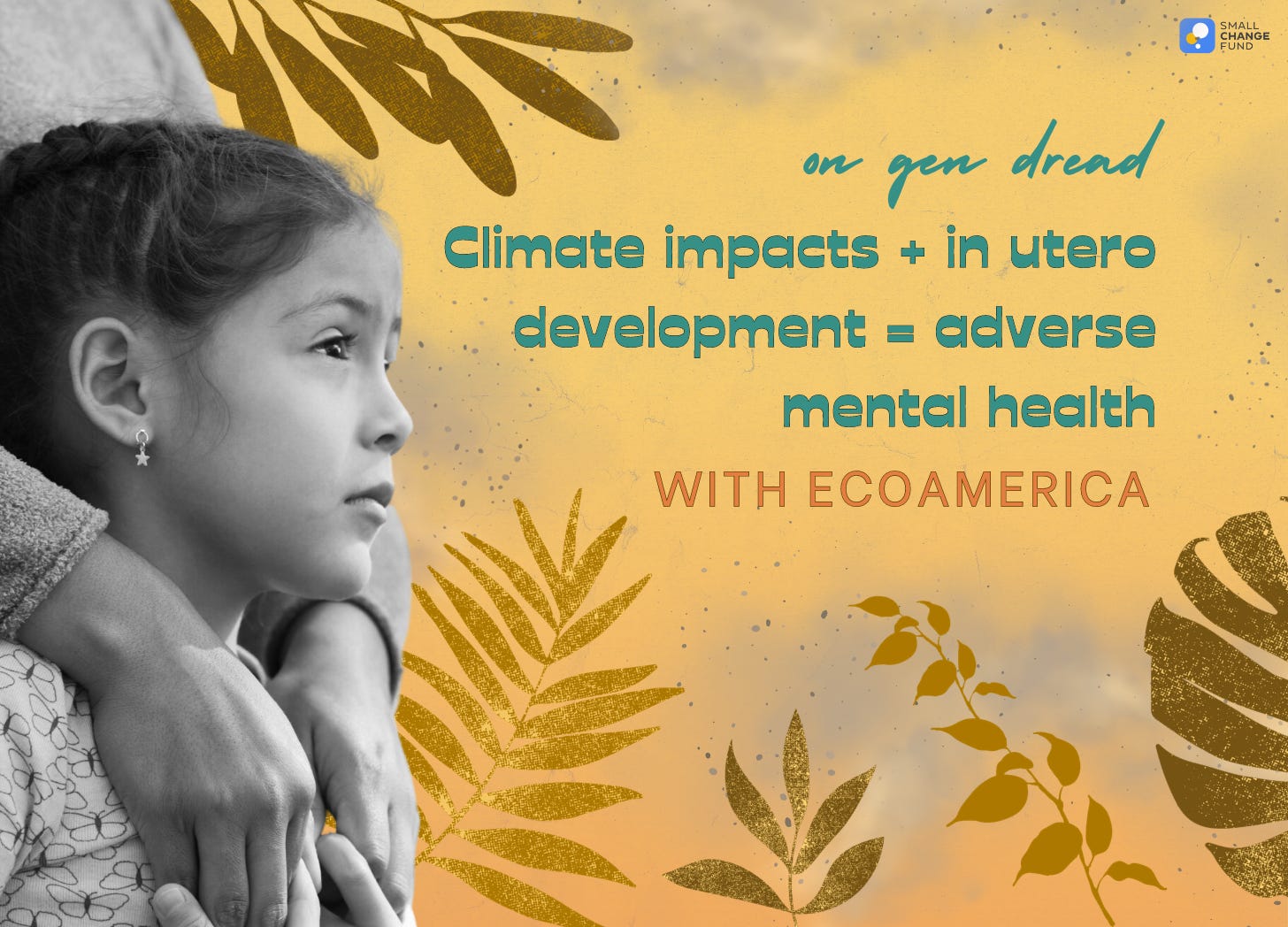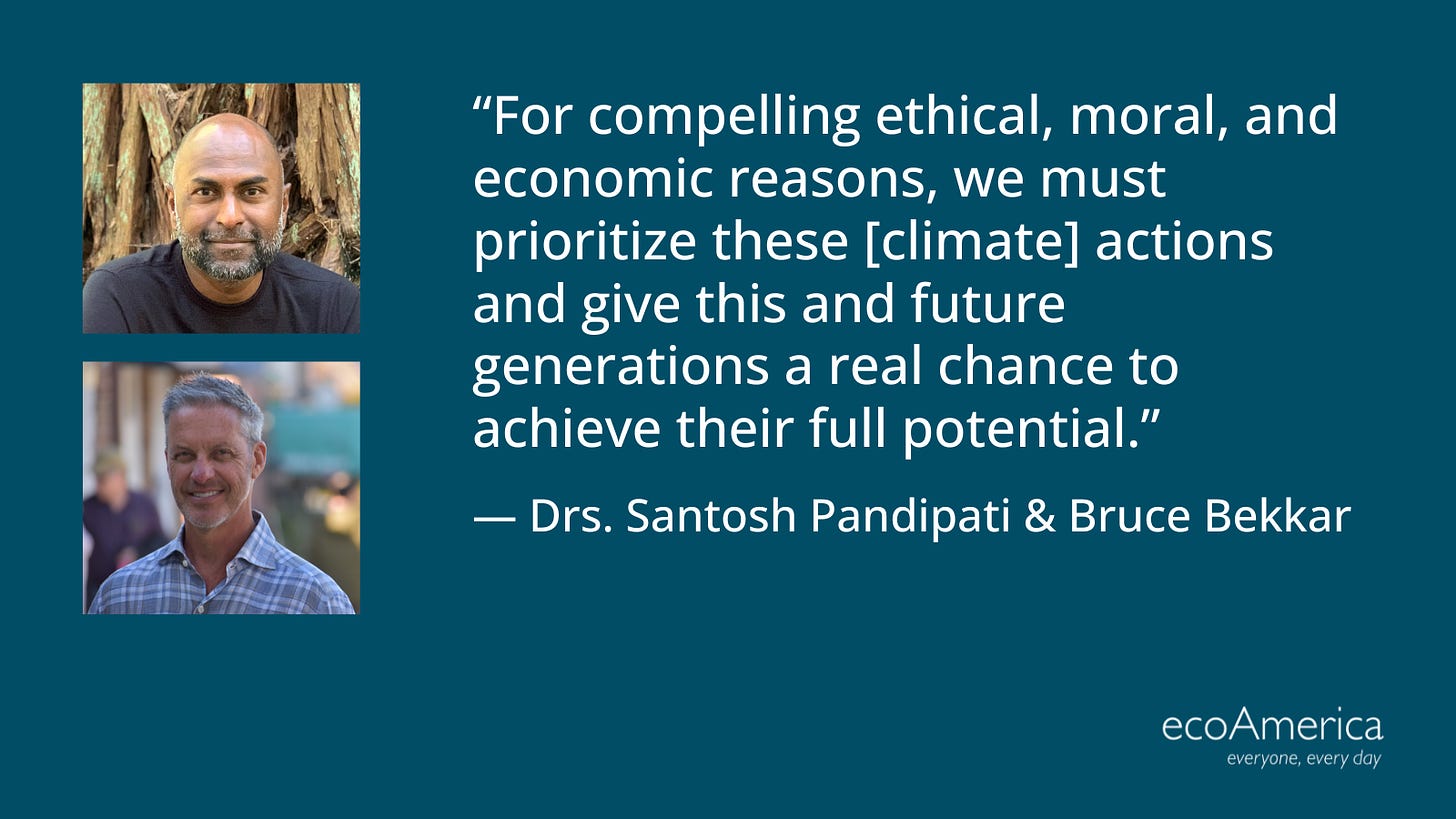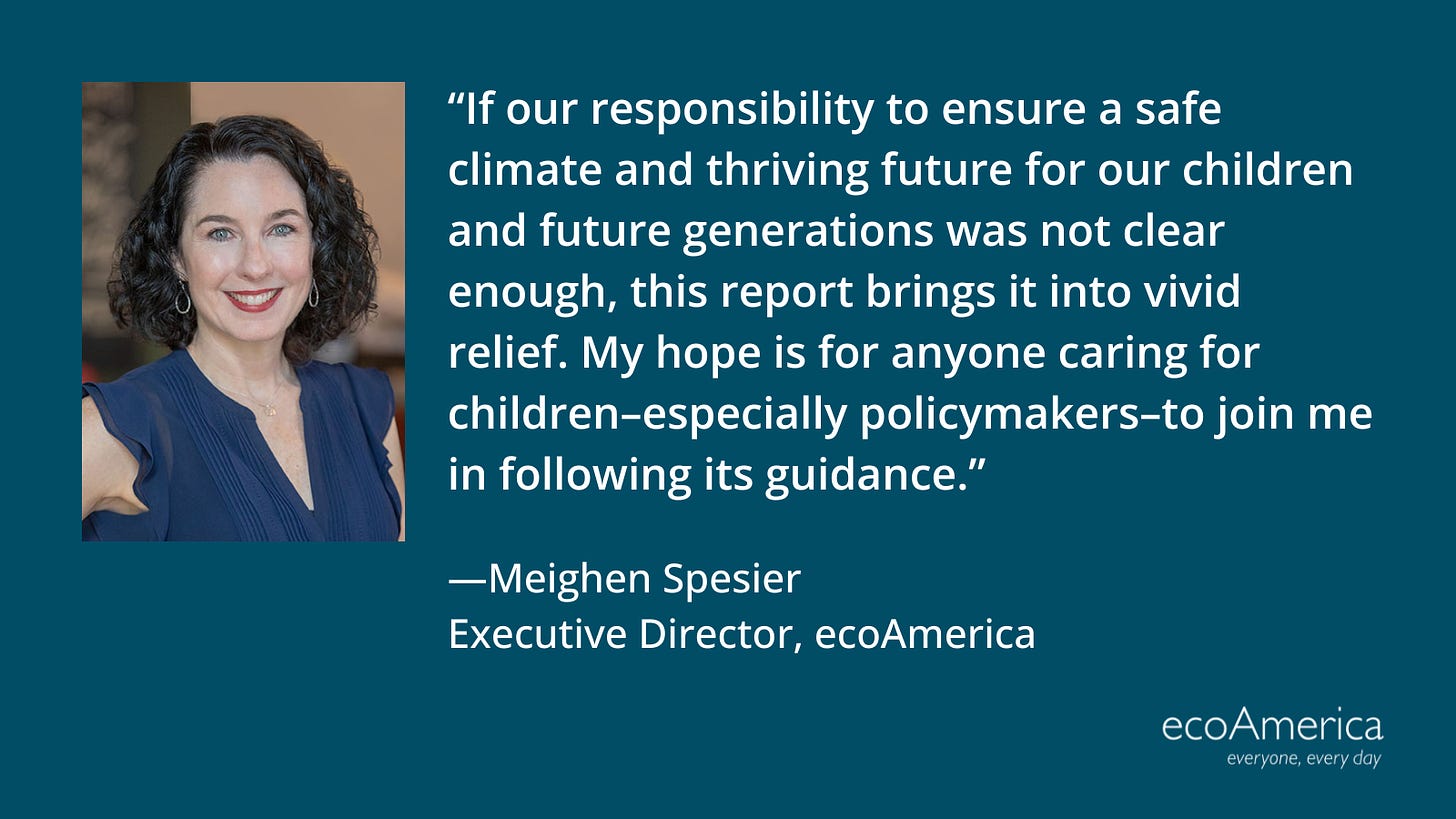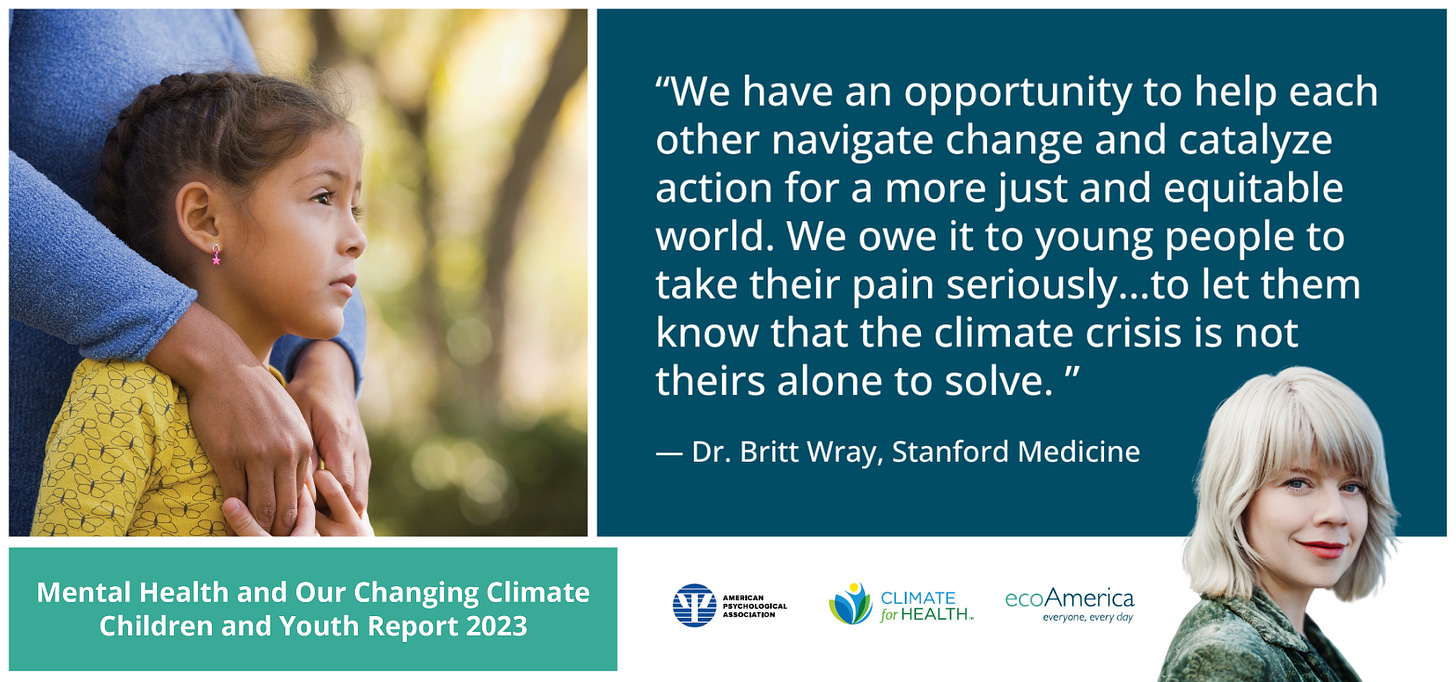Climate impacts + in utero development = adverse mental health
A new report details how climate-related stressors we're exposed to as fetuses shape mental health into childhood and beyond
What happens to a fetus living through a natural disaster?
We’ve talked a lot at Gen Dread about the many ways climate distress is harming young people’s mental health. We’ve covered it fairly recently, in fact. But what about really young people’s mental health? Like, the youngest possible people? Like…they haven’t even been born yet?
Increasingly, research is demonstrating that the climate crisis is really bad for babies in utero, and that their future mental health is being shaped and threatened by extreme weather events. When a pregnant person lives through a natural disaster, serious psychological impacts can reverberate well into their unborn baby’s future.
Recently, a group of scientists and researchers pulled a lot of that research together in a new 48-page report from ecoAmerica and the American Psychological Association. Nicole Hill was one of the people on that team. She’s ecoAmerica’s Research and Marketing Manager, and she walked us through the key findings and implications of this pretty alarming discovery.
GD: Can you give us a brief overview of how the climate crisis can impact a fetus before it's born and how things like extreme weather events can impact normal fetal development?
NH: I think that when most people read that, they're really taken aback, understandably. What we found is that before birth, the potential for impact is pretty significant. So, when a fetus’s psychological system (their nervous system) is developing, climate-related events like extreme weather can influence what their psychological outcomes are later in life. For example, there was a study published in the Journal of Child Psychology and Psychiatry last year that found that preschool-aged children who were exposed to Hurricane Sandy while they were still in the womb had an increased risk of developing an anxiety disorder, depressive disorder, or attention deficit hyperactivity disorder.
There was another study, also Hurricane Sandy-related, that looked at infant temperament and it found that those who were prenatally exposed to Sandy ended up scoring lower on measures of activity level and on extroversion, so, traits of being outgoing, talkative, energetic – more of those social traits. So that’s really intense. So even being exposed in the womb can actually impact you as a toddler, and as a child, and then I think there will be more studies, I'm sure, coming out 10, 20, 30 years after some of these events.
What are the long-term implications for a kid growing up in these cases?
Some of the long term implications are higher risk of depression, anxiety disorders and behavioral challenges. But beyond the implications of extreme weather events, climate change is also associated with high temperatures and decreased air quality. And unfortunately, both higher temperatures and poor air quality have been linked to an increased risk of preterm birth, which in turn is linked to poor cognitive development and risk of psychiatric disorders. And those can persist throughout someone's life, so that's surely a long-term implication.
But…how do we cope with stress we can’t control?
Generally speaking, we know it's not good for a pregnancy to be exposed to high levels of stress of any kind. Does climate-related stress manifest differently?
We don’t think there's any reason to believe that climate change stress has a different psychological manifestation. So the question might be, then, just how strongly the stress is impacting a pregnant person. Like, how severely do they perceive the danger to be, and how capable do they feel of dealing with it adequately? We don't know if or how it manifests differently in the body, but it is another form of stress that we're seeing increased now, and adding on to the other stressors that, of course, pregnant people are already facing. And we know that climate distress is a particularly acute and ongoing kind of stress.
There are a lot of forms of stress where we can take active steps to personally do something about it – like, if I'm pregnant and I'm having a really stressful time at work, I can sit down with my manager and say “look, I need to reduce my hours”. But with climate, there's not a lot you can do as an individual to alleviate the source of the problem. How do pregnant people deal with stress they can’t personally mitigate or control? I would imagine there's also a feeling of hopelessness around the fact that, say, okay, Hurricane Sandy is happening, and I can’t personally do anything to stop it.
Taking action can be really helpful psychologically, especially with other people in your community who are experiencing the same thing. In the report, you'll find a massive Resources section and there are lots of organizations listed there and guidance on how to best take care of yourself. Getting involved in an organization that's already doing this work can help you feel more empowered and less hopeless.
But specifically for pregnant people – and of course I'm not a doctor – but we found that the mental health and wellbeing of parents is really important for the outcome of their babies, especially when their babies get older and become children. It acts as a protective factor for their child's mental health. So when you are pregnant, take care of yourself in the best way you can – and I know it's challenging because society doesn't always support that. It's an equity issue, too, because people of colour in the United States are exposed disproportionately to unhealthy air pollutants, so some of the advice that might be given to make pregnant people feel better, like getting an air filter or limiting time outside, well, not everyone can do that as much as others, so that's a big reason why there needs to be policy change involved.
Children are all of our responsibility.
Was there any aspect of this research that surprised you or shocked you the most?
All of this research is very alarming. But I think what stands out to me the most is the personal stories and contribution from young authors. We asked some young activists and young people who've been involved in climate change and mental health if they'd be willing to share any personal stories and advice they might have for others. Stories tend to stick with me more than numbers. I would certainly urge anyone who reads the report to focus on those just as much as the statistics, because they're so powerful.
One that stands out is from Hannah Estrada, who works with Youth Versus Apocalypse in San Francisco, California. Her piece is about the complexity of climate anxiety and how it's so much more than just global warming and climate change. She talks about how climate anxiety can impact people differently depending on their socioeconomic status and what other factors they're facing at the time, whether that's racism or other forms of marginalization, and I think it gives a perspective about climate anxiety that’s really important for people to think about – especially white people who are working in climate change. It’s on page 17 of the study.
You mentioned some things that pregnant people can do to reduce or mitigate some of the potential harm to their unborn child, but obviously, climate change is not gonna be solved at the individual level. If we adopt the attitude that children are all of our responsibility, what systemic or societal things can we all do to help expectant parents who are experiencing climate distress? What do you think people need to be aware of?
So I have two things. One of them is systemic and the other one is more societal. There’s a bill in the US called the Community Mental Wellness and Resilience Act, which would help fund community-based programs that use public health to build mental wellness and mental resilience. It’s an example of one of the current policies, and I bring it up because learning about the policies at the local and national level, whatever your community is doing, is really important.
At a societal level, lots of people, especially Katharine Hayhoe, say this a lot, but talking about climate change is so important (see page 24 in the report for Britt Wray’s community-engaged project on Climate Conversations). And talking about it in ways where it doesn't always have to be in the language of climate change. Because we know that that can turn a lot of people off and they're no longer listening to you. But talking about climate in the ways that you and the person you're talking to are experiencing it. So, whether that's really intense rainfall or extreme heat, it's important to make those connections between climate change and what you're actually seeing today. Because the reality is it's here today and it's impacting people, it's impacting children. And so we gotta come together and agree on that, and then act on it.
If you liked reading this, feel free to click the ❤️ button on this post so more people can discover it on Substack 🙏🏼
Making Waves
The 4th edition of Mental Health and Our Changing Climate focused on children and youth is now available! This landmark report offers guidance on what you can do to take action and protect young people’s mental health and well-being. Learn about the impacts, solutions, and resources to act on the issue here. You can also access the authors’ takes and the sharing of the findings at the launch webinar that can be viewed anytime here.
As always, you can share your thoughts and reach the Gen Dread community by commenting on this article or replying to this email. You can also follow along on Twitter and Instagram.
‘Till next time!









Climate change is being overblown by:
1. attention-seekers looking for attention
2. politicians looking for votes
3. entrepreneurs looking for tax subsidies and beneficial regulations.
Keep in mind that academic researchers face pressure to generate papers which in turn generate media coverage. They have to keep their funding secure through grants, or the gravy train comes to a full stop. The extreme changes proposed in this article and echoed by Yuri B. are simply not justified by the evidence. Extreme weather events - heat waves, tornadoes, floods - are no more common today than they were in the past. Don't be fooled by the propaganda.
When JB came in, the first thing he did was block the Keystone Pipeline. JB tried to cut a deal with the Venezuelans and the Iranians. (As if we couldn't do business with Canada! Absurd.) Now we are in a situation where global demand for oil is about the same as 2019, but the price of oil has doubled. As we face increasing inflation and an energy shortage, there are two options:
1. option 1 - go back to coal.
China, India, Brazil
Most emerging market countries are going down this path. People are saying, 'to hell with climate change, to hell with COP 27 - between being COLD and being POLLUTED, I choose being POLLUTED."
2. option 2 - ration energy
It's economic suicide. You kill jobs, 'falsify' prices and mess up the economy.
We face high inflation, unfolding energy crisis, sovereign debt loads that are going to mean entire countries imploding, a miserable outlook for US treasuries, and WW3.
If you're reading this on your electronic device, remember that human life in most of the world still has the Hobbesian description - solitary, poor, nasty, brutish and short.
Reject this "dire futurology." Human nature is not immutable, and you don't have to attribute significance to transient events or engage in this sort of neurotic ennui.
Extinction Rebellion is right that kids generate way more carbon emissions than anything in your life. Therefore, the best way to fight climate change is to not have children. No need to expose them or you to the stresses of global boiling and the climate emergency.